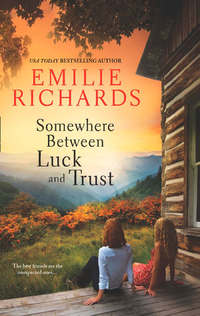
Полная версия
No River Too Wide
“That’s what I’ve been told.”
“There aren’t any guarantees, Jan, but after I told her how careful you were getting away, she said if we observe security precautions here, if you’re careful to vary your routine, get your mail somewhere else, use a different name, then we’ll most likely be safe. If he does show up, then we go to the police. They take stalking seriously, and under some circumstances it’s a felony. Harmony witnessed your husband’s abuse. The police won’t be able to blow this off.”
“I didn’t think...” Jan’s voice trailed off.
“What?”
“Everyone seems to think it’s okay to stay here, even the people who brought me this far.”
“That’s who you were talking to.” It was more of a statement than a question.
“She wished me well, and she told me to call her directly if I need help.”
Taylor motioned to a stool in front of the counter. “Come have your wine and something to munch on.”
Jan did as she was told, something she was particularly good at. She ate a cracker with a slice of cheese and waited for her stomach to reject it. But instead the food made her hungrier. She took a second, then a sip of the wine.
“I only poured you a little,” Taylor said. “On an empty stomach it’s twice as powerful. But let me know if you’d like more.”
“Less is better, I think.”
“If I were you right now, I would need to relax, and maybe a little wine will help.”
“It’s hard. For months I’ve been gearing up to go one place, and now I’m in another. I never intended to come to Asheville at all. It seemed too dangerous. But after the fire? I just knew Harmony would find out somehow, and she would be sure I was dead. I couldn’t let that happen.”
“I’m so glad you came.”
Jan still wasn’t sure. All this well-meant reassurance didn’t take into account the will or the whims of the man she had been married to.
“Did you have a place to go?” Taylor asked. “I mean a house, a job, a life somewhere else?”
“We were working on it. Then Rex didn’t come home from work, and I knew I had to leave right away while I had that chance.”
“But you were able to get things in place quickly.”
Jan wanted to tell Taylor more, but sharing her life, even a little piece of it, was a luxury she hadn’t experienced in years.
“Not quickly,” she said. “Last New Year’s I met a woman at a party. I didn’t go to many parties, but this one was, well, it was required for my husband’s job, so I had to go along and look happy.”
“I’m guessing over the years you’ve learned to be a good actress.” Taylor set a salad on the counter and turned to do something at the stove.
“I like to cook,” Jan said, while she decided how to respond to that. “I could cook for you while I’m here, take some of that off your shoulders, anyway.”
“Great. We’ll work that out.”
Jan took another sip to steady herself. “At that party? There was a woman who knew my husband. I’d met her a couple of times over the years. She got me off to one side when he was talking business with some men. And she said she worried about the way he treated me. She told me to call her if I needed help, that she was part of a group of women who helped other women who had trouble at home.”
“How did she know that just from seeing you at a party?”
“Later she told me her first husband nearly killed her before she got out of the marriage. She recognized a fellow sufferer from the fear in my eyes. And she knew Rex well enough to suspect he could be mean.”
Taylor whistled softly. “It was that obvious?”
“I had bruises on my wrist. She paid attention. And she said I needed to get out while I still could.”
“You said she was part of a group of women who do this?”
“More like a network all over the country.” Jan hesitated, but there was no reason to do so. Taylor wasn’t going to turn anybody in. “Lady truckers. They call themselves Moving On. My husband sells insurance for trucks, and that’s why we were all at that party together.”
“That’s rich. Who better?”
“I called her two weeks later. One morning she waited until Rex left for the office. Then she came into our place the back way. We talked for an hour. She told me what they did and how successful they were. It’s been going on for years. Sometimes women go back to the men who beat them, because they can’t adjust, but nobody who stayed away has ever been found. I’ve wanted to get away for years, but...” It was too difficult to explain. She shrugged. “Anyway, I wanted to leave sooner, but Rex was watching me.”
“I’m not a counselor, just a friend, and a new one. I think it’s going to be difficult to put all that behind you. It’s going to take years. But you said something earlier that I want to put out on the table. You said you weren’t going to bore me with stories of your past?”
Jan realized she had done just that again. She didn’t know what to say, but Taylor went on.
“If we’re going to be friends, and I want to be, we’re going to have to bore each other with stories of the past. Because that’s what friends do. Only neither of us will be bored, Jan, because friends are interested in each other. I know you’ve been through hell, and whenever it’s helpful to talk about it, I’ll be happy to listen. I probably won’t have any answers, but that’s okay, too.”
“Do you have stories you’ll share?”
“I could spend hours just telling you about my mom and me, and all the years I kept her away. And about getting pregnant at seventeen and holding a grudge against Maddie’s father most of her life. I’m light-years from perfect, so with that out on the table, we can just find our way together, okay?”
Jan felt tears glaze her eyes, but she smiled. “Friends,” she said.
“Good. Now let’s talk about something that’s also important.” Taylor smiled, too. “What we’re going to put on our pasta tonight.”
Chapter 8
Harmony’s mother had been living at Taylor’s house for three days. Harmony still couldn’t quite believe it. Using Rilla’s cell phone, she had spoken to her mother twice. In the unlikely event the Reynolds’ landline was being monitored, they had all agreed that Harmony would use Rilla’s cell and Jan would use Taylor’s for extra security.
Jan.
She still couldn’t get used to her mother’s new name. Janine Stoddard was Jan Seaton now, and while the Jan made sense and might even be risky, Seaton had been picked out of thin air. Moving On had found it was easier for women to remember their new names if their initials stayed the same. That might be risky, too, but not as risky as a woman forgetting what she called herself these days.
The name change wasn’t official, of course. Jan had no ID that said Seaton, but she also had no intention of needing ID.
Harmony had tried to fill her days with work and Lottie, but her mind was focused on the extraordinary turn of events that had brought her mother to Asheville. The Topeka paper had moved on to other stories, so news was difficult to come by, but she knew from the last conversation she’d had with her mother that her father still hadn’t been sighted. His disappearance was perplexing, even worrisome, since no one could monitor his movements. Was he searching for both of them, following the trail Moving On had so carefully laid to the West? Was he following the real trail to North Carolina, so that one day soon he could show up on Harmony’s doorstep?
Neither seemed particularly likely, and that was the worst of it. After years away from home, trying to think like her father brought back a childhood in which she’d tried to anticipate his every move and mood. She had hoped those days were gone forever. She never wanted to give him that much thought again.
Right now, though, she was thinking about the evening to come. “Lottie Lou, you’re going off with your daddy again,” she said, bending over the car seat where her sleepy daughter was fidgeting.
Lottie flailed her fists and screwed up her face in protest. Harmony wondered if Davis would give her back the moment Lottie started to fuss. The baby was normally good-natured, but her afternoon nap hadn’t gone on nearly long enough.
Harmony was still surprised Davis had asked to take Lottie for the evening. She had assumed his mother was back in town, but when she asked he’d said no. Maybe he had been vague, but Harmony had been pleased at the opportunity to have a babysitter.
Because she had a date.
With everything else going on, she had forgotten all about it until that morning—too late to back out politely—when Taylor called to remind her. She was having dinner with a friend of Taylor’s, and she hadn’t been to Cuppa—where she used to be a server—for months, but it was a comfortable, casual kind of place to meet a guy, so she’d agreed. The plans had been made, of course, before her mother arrived.
Since she believed in signs—at least when they were good ones—the fact that Davis had called right afterward to say he wanted to take Lottie for the evening had convinced her she had to go.
The doorbell rang, and she wondered if Davis would remember it took time to lug the baby downstairs. She was almost at the door when he tapped and opened it. “I thought you might like some help getting her down.”
This wasn’t a sign; it was a miracle. She swung the car seat in his direction and he took it. “I’ll bring the diaper bag,” she said, gathering it from the sofa, along with her purse. “I’m going out, but I’ll have my cell phone with me.”
“I’ll call before I bring her back.” He bent over the car seat and smiled at his daughter, who still didn’t look happy. “Are you ready, Peaches?”
“Peaches?”
“She has cheeks like little peaches. You never noticed?”
She was thunderstruck. Was this the same Davis whose main thought when he found he was going to be a father was whether a baby might help him secure a promotion at work?
“I might as well tell you I have a woman with me,” he continued. “Her name’s Amy, and she wants to meet Lottie.”
That sounded more like the old Davis, and Harmony sniffed. At least he’d told this Amy person he had a daughter.
She followed him down the stairs to his car, and as Davis struggled with the baby’s car seat, the woman on the passenger’s side opened the door and swung her legs around to sit sideways. Shining red hair was arranged over one shoulder, and her makeup was so carefully applied that Harmony figured it had taken as long to do it as she had spent on her own in all the months since Lottie’s birth.
“You must be Amy. I’m Harmony,” she said when Amy didn’t speak.
Amy nodded. “Does she cry a lot?”
“Just when she’s unhappy.”
As if on cue, Lottie began to whimper. Amy’s lovely face tightened into something approaching a grimace.
Harmony really didn’t want to help, but she knew it was the right thing to do. “She didn’t have a very long nap this afternoon, so she’s tired. She’ll probably fall asleep quickly. She’ll be in a better mood by the time she gets out of the car.”
“Maybe you should have given her a longer nap.”
“Short of drugging her or hitting her over the head, I’m not sure what I could have done.”
“I believe in schedules.”
“Most people who don’t have children do.” Harmony stepped back and addressed Lottie’s father. “Davis, make sure you call if you need advice. Me, not your mother.”
He grunted something profane about seat belts and infant car seats, and she left him to figure out the mysteries of parenthood by himself.
Upstairs she took a moment to peer at her face in the mirror. Freckled, with sandy lashes. Wide mouth, slightly crooked teeth that should have worn braces—which her father had frowned upon as vanity—long, pale brown hair that was only streaked with blond because she was out in the sun so often, not because she had the time to do anything about her hair except let it grow.
She was going to be late if she did anything much to improve what she saw. She scraped a little mascara on her lashes and brushed some mineral powder over her freckles; then she grabbed her purse, which felt as light as air after hauling a diaper bag, and peeked through her window to make sure Davis was gone. Since the coast was clear, she headed downstairs and away.
Fifteen minutes later she was walking into Cuppa after scoring an amazing parking place right in front, another sign. On the drive she had tried to remember what Taylor had told her about Nate Winchester. They had been friends in high school, and then he had gone off to college, followed by the army. He had only recently returned to run the family custom cabinetry business, which did a lot of work for Ethan, Taylor’s architect father. Taylor said Nate was one of the good guys, a sweetheart. They had been friends so long they would never see each other as anything else, but she’d thought maybe he and Harmony might strike a spark or two. Taylor thought they had a lot in common.
Harmony and Nate had shared one rushed phone call. They’d nailed down the time, but now she couldn’t remember how she was supposed to recognize him. In a minute she realized it didn’t matter, because all her old friends on staff came over to greet her and find out how she was doing. When the crowd cleared away, Nate was the only one left.
“Hi,” he said, holding out his hand. “I’m Nate.”
She smiled because his smile was infectious, and she took his hand for a firm shake. “You’ve guessed who I am.”
“Taylor told me to look for a tall blonde with lots of friends.”
Harmony hadn’t been on a date since she and Davis were a couple. She tried to remember how she was supposed to examine a guy without looking as if she had a checklist. Her initial impression was that once she had a list in hand, she would need a good pen, because this time she would be making lots of check marks.
Nate was taller than she was, lean and muscular, with friendly brown eyes and auburn hair cut short, but not too short. His clothes were casual, but not sloppy. His trousers looked freshly pressed, which almost made her smile, since she wasn’t sure she owned an iron.
“I have a table,” he said. “I bet the service is going to be great. They’ll be fighting over you.”
She followed him to a corner. Cuppa had been little more than a coffee shop when she began working there, but later it had morphed into a bistro. Now it sported topiaries on the sidewalk and hanging ferns in the windows, along with an expanded menu, although the coffee bar jutting along one side was definitely casual. Tonight the room was crowded, but Nate had a good eye, and he had chosen the one corner table where they might have a little privacy.
“I hope you’re hungry.” Nate waited for Harmony to choose a seat; then he pulled out her chair.
She thought this was, quite possibly, a first. When had anyone seated her, except possibly the waiter at the country club dinner she had once attended with Davis? She put a mark next to “polite” on her mental checklist and smiled her thanks.
She thought it was wise to immediately bring up the subject of Lottie. If Nate wasn’t interested in a single parent, he ought to know right now that she was one. She made sure she sounded matter-of-fact.
“The closest I’ve gotten to eating since breakfast was finishing the Cheerios on my daughter’s high-chair tray.”
“Is she old enough to feed herself?” he asked without missing a beat.
“She thinks she is. I shovel in whatever I’ve prepared between her finger food.”
“I’m the oldest of six. I was the only kid who went to Covenant Academy with rice cereal and mashed bananas on his shirt.”
“Your job was feeding the babies?”
“Until I got my driver’s license. Then I was in charge of pickup and delivery. My sister still talks about the time I took her to ballet class with a crate of chickens and a goat in the back of our minivan. My mother was trading livestock with another farmer across town.”
“You come from a farm family?”
“We have two acres, and Mom used every inch while we were growing up, but now a lot of the garden area is devoted to wildflowers. She got rid of the goats last month. I think the bees will go next.”
“Six kids?” She tried to imagine it.
“Devoted Catholics, although they sent us to Covenant Academy instead of Catholic schools because they liked the curriculum better.”
“I think I’m more a Buddhist than anything, although I don’t really go to church,” she said, waiting for him to scrunch up his face and remember a prior commitment.
“I’m just trying to live a good life,” Nate said with a grin. “I leave all the theology to people who are more worried than I am.”
He hadn’t flinched over her single-parent status. He hadn’t flinched over her religion or lack of one. “The veggie pizza here is a standout,” she said. “Did Taylor mention I’m a vegetarian?”
“I don’t remember. I’m one of those guys who’ll eat anything. Buffalo burgers? Brussels sprouts?” He shrugged, as if to say he didn’t care which.
She put down the menu, which hadn’t changed since her days on staff. “It’s possible you’re too good to be true.”
“I hitchhiked to San Francisco when I was sixteen to attend a Star Trek convention. I have an autographed poster of Captain Jean Luc Piccard in a safe-deposit box.”
“That’s the worst you’ve got?”
“Geekier than that? I played tuba in the academy band, mostly because I was the only one who could lift it out of the case. I went into the army because they promised me the Mideast. Then they sent me to Honolulu. I spent the whole time upgrading cabinets in officers’ housing at Schofield Barracks.” He grinned, an infectious, friendly grin. “Bad enough for you?”
She smiled, too. How could she not like Nate Winchester? Still, she had to counter.
She leaned forward. “I’m the product of a family who gives the word dysfunctional new meaning. I got pregnant despite using birth control and refused to marry the father when I realized he wanted to use our baby to impress the partners in his accounting firm. Now I work on a farm. Digging in the dirt and cleaning out the barn makes me happy in a way nothing else ever did. I want to be a lawyer, but I haven’t even started college and won’t until Lottie’s a little older.”
“Just so I know?”
She nodded. “Just so you know.”
“How about a glass of wine? And I’m good with the veggie pizza if you want to split one.”
“White wine for me, and you won’t have much choice on the brand—they’re probably still working on their wine cellar. Oh, and I don’t like Brussels sprouts.”
“Duly noted.”
She didn’t like Brussels sprouts, but she did like Nate. How could she not? As he gave their order, though, she was also aware that while she liked him just fine, sitting here with him was like sitting with a new girlfriend she’d met at the gym or the produce section of Fresh Market. He was good-looking, funny, intelligent and kind.
And she didn’t feel even one faint spark igniting between them.
Chapter 9
From the audio journal of a forty-five-year-old woman, taped for the files of Moving On, an underground highway for abused women.
The first time the Abuser slapped me I was stunned. Three weeks after we were married in a simple ceremony, he came home to find that I had rearranged the kitchen of our new house to better suit my needs. Since I did all the cooking, I never considered that when he unpacked our new utensils and dishes he had meant for them to stay in the cabinets he had chosen. Foolishly I had even expected him to be pleased I was settling in and making our house a home.
He was sorry afterward, of course, tired from a long day at work in a job he despised because he hated taking orders from people who weren’t as smart as he was. Sorry enough that as he moved the kitchen contents back where he had first put them, he said he would have to remember to be more patient, that he knew I was learning to be a wife. But since he lived in the house, too, I should remember that all our decisions were to be made together.
Of course, as time passed I realized that there was no “together.” The Abuser decided everything, and when he did consult me, often his intention was to find out what I wanted so he could do the opposite.
Not always, though. Sometimes he surprised me with things he knew I yearned for—frequently enough, in fact, that I continued to believe he loved me and there was hope for our marriage. Sometimes, too, if I asked sweetly enough he would let me have my way, as long as I understood it was a privilege he had granted because he was a model husband.
Some things, of course, were permanently off-limits. He claimed we couldn’t afford a second car so I could do errands on my own, and on the rare occasions I had the family car to myself, I was suspicious that he checked the mileage to be sure I hadn’t gone places I hadn’t told him about. He preferred that my old friends not visit when he wasn’t at home. Wasn’t daytime set aside to clean and cook? He had his job; I had mine.
Of course, evenings and weekends were our time together and not to be shared.
The second time he hit me I had just returned from a spontaneous shopping trip with a college friend. When he demanded to know why I had ignored his wishes, I reassured him, pointing out that the night’s pot roast was simmering in the slow cooker and freshly ironed shirts were hanging in his closet.
So much time has passed I wonder now if I realized that afternoon that the trap was closing. That apologies were meant to keep me in line just as much as striking me was. That I could still find a way to be free of him with a little cunning and the help of the friends who hadn’t yet forgotten me.
I really don’t know. I do know I was determined to make our marriage a success. And wasn’t the violence rare and the Abuser sorry? Didn’t that make all the difference?
* * *
Jan had known she would have to shop for clothes since she was washing the few things she’d brought every other day. When she was making plans to escape and gathering necessities, she had even told herself shopping once she “moved on” would be fun. She could choose colors Rex had discouraged and styles that might actually look good instead of her usual drab, loose clothing that guaranteed she would fade into the background.
Of course, fading into the background might be a good thing until she knew for sure where her husband had gone. But in an odd sort of way, brightening her wardrobe might actually help her hide, since if anyone besides Rex was searching for her, they would be looking for a frumpy woman with no fashion sense and no courage.
Which, she was afraid, was sadly accurate.
“I can drop you off in town, but we’ll need to leave shortly,” Taylor said, glancing at the kitchen clock as she put away their lunch things. “My dad’s going to meet me over at the studio to see how the upstairs renovations are going. But he has another appointment at four, so I can pick you up just a little after. Will you be okay in town that long?”
Jan couldn’t imagine that much free time. And in a strange town? Where nothing was familiar, and she had no idea where to go?
Taylor seemed to sense her discomfort. “We can wait and go to the mall next time I have a few hours off. I’m just afraid if I try to drop you off there today, I’ll be late.”
“Oh, absolutely not. I’ll enjoy prowling around Asheville.” Jan put on her brightest smile. “And if I get lost, you can guide me in once you come back to pick me up.”
“The city’s small enough I think you’ll be fine.”
“Although what about Maddie?” Jan hoped she didn’t sound as if she was grasping at straws. “Shouldn’t I stay home so she’s not alone when she gets back from school?”
“She’s going over to her friend Edna’s house. You’ll meet Edna before too long. Her mom, Samantha, is one of the goddesses.”
Jan had heard all about the goddesses, an idea that hadn’t seemed too far-fetched, since her own goddesses, the truckers of Moving On, only did what they did because they wanted to help and for no other reason.










